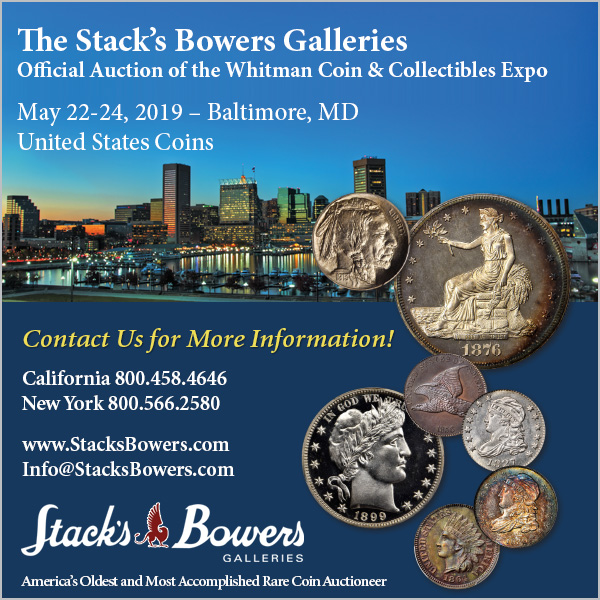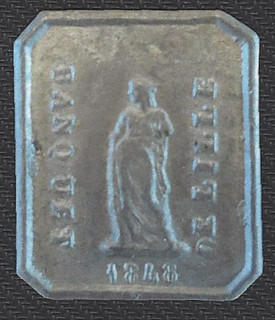
PREV ARTICLE
NEXT ARTICLE
FULL ISSUE
PREV FULL ISSUE
NOTES FROM E-SYLUM READERS: MARCH 24, 2019The E-Sylum Dazzles
I sent a photo historian in Boston your latest issue, since it features a Massachusetts article. And I wanted to dazzle him with it. He could not imagine doing such a publication weekly. And for over twenty years was unreal. Thanks for enabling me to dazzle such people. To read the earlier E-Sylum article, see:
Query: Maris Sale Fugio Cent Die
John Dannreuther and I wondering if Lot 628, the Fugio die, from Chapman's 11/16 -17 1900 Maris sale is plated. Can anyone help? -Editor Fippence and Fippenny in England and Canada
Some further definitions of fippenny etc. that can be traced back to 1607. Ed provided these definitions. -Editor From: Merriam-Webster
- called also fip, fourpence ha'penny, sixpence From: The Oxford Universal Dictionary on Historical Principles, 3rd edition 1955, p702: Fip. U.S. 1844 [short for fippenny bit]; Fippenny Bit, or contracted, Fip, fivepence. "In Pennsylvania . . the vulgar name for the Spanish half-real." Taken from John Bartlett's Dictionary of Americanism (1848, etc., 1876). Fippence. 1607. [Corruption of five pence.] From: Dictionary of Americanism, John Bartlett, 1848, p139: Fippence, for fivepence, is also provincial in England. From: Dictionary of Numismatic Names, Albert Frey, 1973 reprint, p84: Fip. A corruption of fipny bit, i.e., a five-penny bit. It was used in the Eastern Middle States for the Spanish Medio or half Real. Paul R. Petch writes: Being a Canadian, the terms fippence, and its close associate fippenny, are new to me. It is possible that that there were some early Canadians, probably of British origin, who used these terms to refer to our five-cent denomination. This would justify Appleton's New English-Spanish, Spanish-English Dictionary believing them to be Canadian terms. However, more astute than Appleton is the Oxford English Dictionary. The OED does not list fippenny, but fippence does appear as a colloquialism and corruption of five pence, which certainly does make sense. More than this, and in the thorough style of the OED, historic uses of the term are: 1607 R. C. World of Wonders 50 Women gorgeously apparelled, finicall and fine as fippence. 1721 J. Kelly Scot. Prov. 18 As fine as Fippence, you'll give a Groat raking. 1823 Blackw. Mag. XIII. 457 On leaving the lush-crib, we can figure them giving fippence to the drawer To me, this firmly establishes fippence as a term used in England and not extensively in Canada. Thanks, guys. -Editor To read the earlier E-Sylum article, see:
The Banquet de Lille
Thanks. John provided this link for more information. -Editor To read the earlier E-Sylum article, see:
To read the earlier E-Sylum article, see:

Wayne Homren, Editor The Numismatic Bibliomania Society is a non-profit organization promoting numismatic literature. See our web site at coinbooks.org. To submit items for publication in The E-Sylum, write to the Editor at this address: whomren@gmail.com To subscribe go to: https://my.binhost.com/lists/listinfo/esylum All Rights Reserved. NBS Home Page Contact the NBS webmaster 
|
